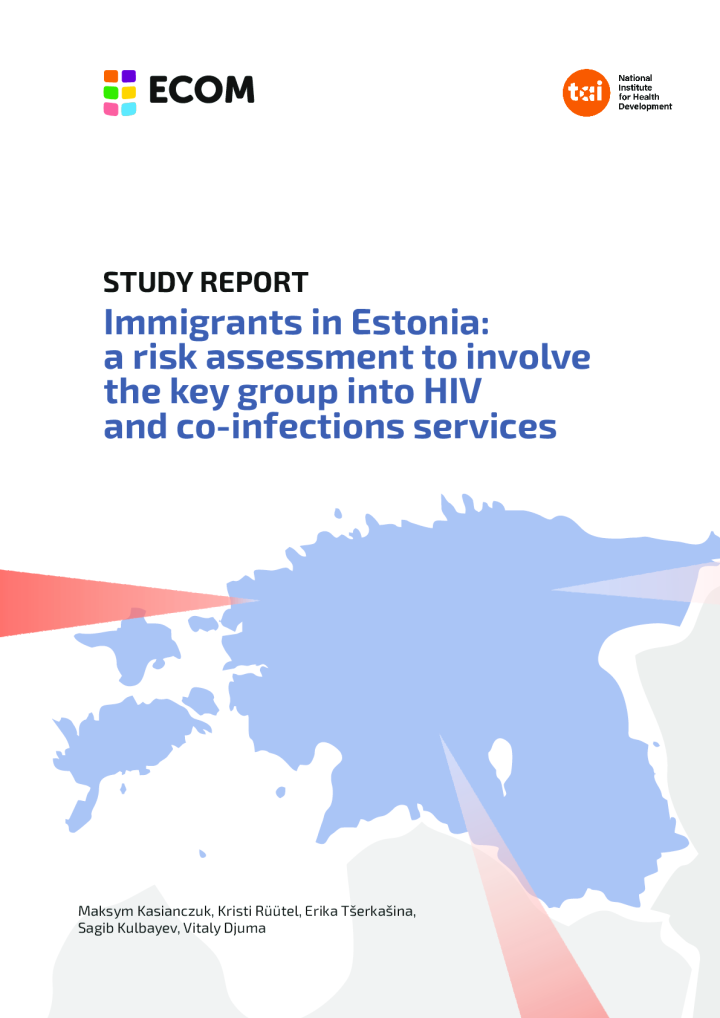Immigrants in Estonia: a risk assessment to involve the key group into HIV and co-infections services
Introduction
Migration affects the epidemiology of infectious diseases, including HIV, tuberculosis (TB) and viral hepatitis. For example, 44% of those diagnosed with HIV in the European Union/European Economic Area in 2019 were migrants. Migrants face barriers to accessing and adhering to care, including low self-perceived risk of TB, stigma, and fear of discrimination at health services. This should be considered in the provision of services. In 2020, more than 16,000 people immigrated to Estonia. So far, migrants have played almost no role in Estonian HIV epidemic as well as in the burden of co-infections. The aim of the study was to assess the risk-behaviors related to HIV and co-infections among different sub-populations of migrants in Estonia as well as map their needs and identify the gaps in existing prevention, social and health care services.
Methodology
Twenty-two in-depth semi-structured interviews with representatives of different subgroups of migrants and three interviews with specialists working with migrants were conducted. The focus wasnon newly arrived migrants (in the last three years) to study how people are adapting in Estonia in the context of public health. Different groups of migrants were aimed to recruit, including vulnerable populations (illegally working people, men having sex with men (MSM), people living with HIV).
Results
Other migrants, non-governmental diaspora organizations and family members both in Estonia and abroad were mentioned to be the most important sources of support. egarding access to health services, several misconceptions and lack of information about what is available and who could access the services emerged as problematic issues. The main hindrance for accessing health care was related to the status — illegal immigrants and people with no residency permit had no access. Illegal migrants were also afraid of the consequences and loss of confidentiality in case of asking any medical help. Participants also reported similar problems with health care services as Estonian general population — long waiting lists, high prices (especially dental care), not attentive medical personnel. Language and cultural issues were mentioned several times — even it Tallinn had been difficult to find a doctor who spoke English or Russian and medical personnel was not used to communicate with people with other cultural backgrounds. Participants also reported difficulties in accessing birth control measures as well as condoms. Most of the participants were aware of HIV and tuberculosis and had been tested during their lifetime. Testing during their stay in Estonia was limited, especially tuberculosis screening. All four HIV-positive participants received free ARV therapy and had no complaints about the system. Most MSM migrants (n = 9) had not heard about pre-exposure prophylaxis of HIV and only a few had used it in Estonia. The system for providing pre-exposure prophylaxis was considered complicated. In the context of vaccination, influenza was the most frequently mentioned (at the time of data collection, vaccination against COVID-19 was not widely available). Two thirds of the respondents said that no one in Estonia had ever offered them to be vaccinated.
Conclusions
In conclusion, people newly arriving to Estonia highlighted the gaps in Estonian health system which also local people are not satisfied with. But they also experienced unique issues related to their status. In the near future, education and information for the specialists working with migrants and asylum seekers in a variety of organizations should be provided. Information and educational programs for the migrants should be culturally appropriate and tailored to their needs. Reduction of stigma and enforcing human rights is essential in order to meet the needs of people. From public health point of view, it is necessary to provide basic health services for illegal undocumented migrants, including making sure they receive care for communicable diseases as early as possible. This is especially important in the light of COVID-pandemic. Migrants themselves can serve as a significant human resource for HIV service organizations, and their involvement as volunteers would contribute to a more successful prevention of HIV and co-infections.
